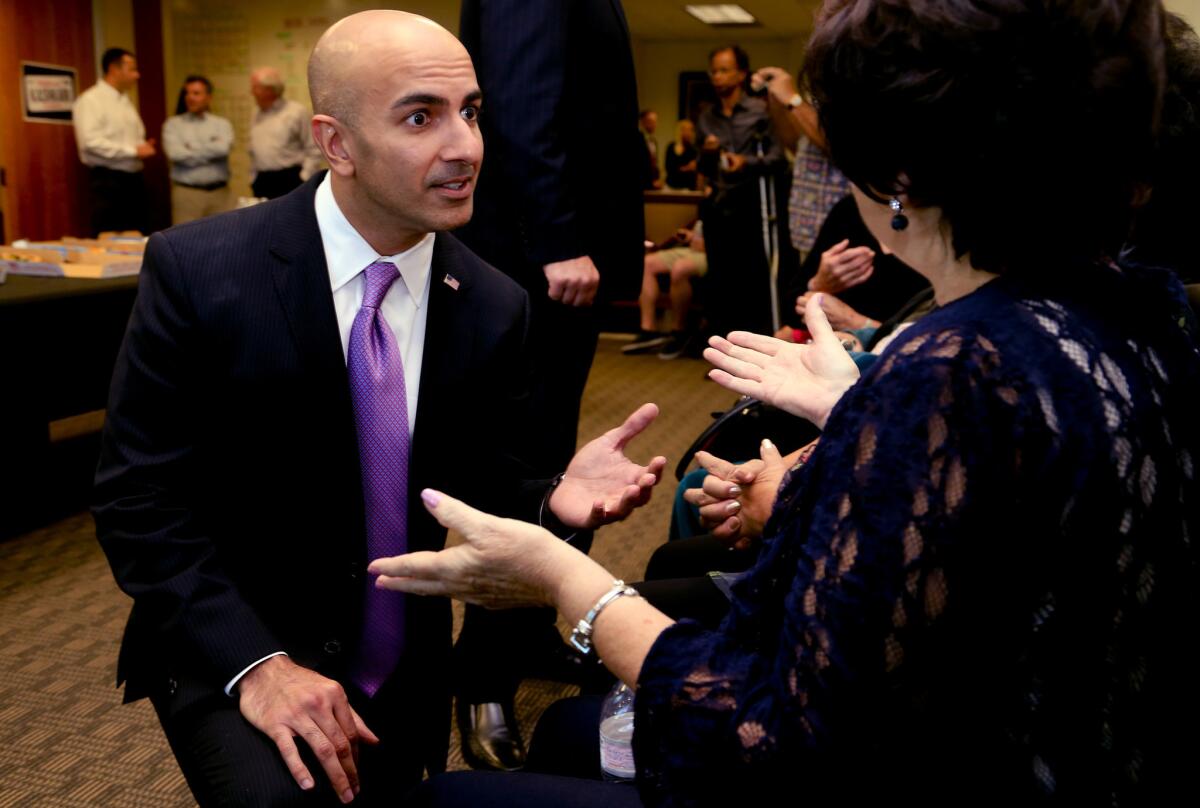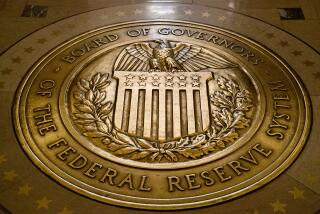After failed GOP bid to be California’s governor, Neel Kashkari will head Minneapolis Fed

Neel Kashkari talks to supporters in Tustin on the eve of the 2014 California gubernatorial election. Kashkari, who was the GOP nominee, has been named as president of the Federal Reserve Bank of Minneapolis.
After an unsuccessful detour into California politics, Neel Kashkari is back in the banking world.
The former executive at Goldman Sachs Group Inc. and Pacific Investment Management Co. was named on Tuesday as the next president of the Federal Reserve Bank of Minneapolis.
It will be a return to government service for Kashkari, 42, a former Treasury Department official who is best known for running the $700-billion bank bailout initiative known as the Troubled Asset Relief Program from 2008 to 2009.
Last year, as the Republican gubernatorial challenger, he touted that government experience and his ability to work with both political parties to administer the complex TARP bailout. But Gov. Jerry Brown handily defeated Kashkari in the general election by 20 percentage points.
Kashkari, who spent about $3 million of his own money in his uphill campaign against the popular Democratic incumbent, took some unconventional steps to draw attention, such as handing out free $25 gas cards at one event and living as a homeless person for a week in Fresno to highlight poverty.
Now Kashkari, who is not an economist, will have a role in supervising banks in the upper Midwest and will get a say in the nation’s monetary policy.
SIGN UP for the free California Inc. business newsletter >>
The Minneapolis Fed is one of 12 regional banks in the Federal Reserve System. Its president is a rotating member of the Federal Open Market Committee, which sets the central bank’s monetary policy.
Kashkari, who said he was honored to have the job, will take over on Jan. 1 for a five-year term. The position’s salary was $338,700 last year. He will be an alternate member of the committee next year and will be a voting member in 2017.
“Mr. Kashkari is an influential leader whose combined experience in the public and private sectors makes him the ideal candidate to head the Minneapolis Fed,” said MayKao Hang, the incoming chairwoman of the Minneapolis Fed’s board of directors.
Kashkari “stood out because of his inspiring leadership skills, solutions-oriented nature, collaborative style and deep commitment to public service,” said Hang, who was co-chair of the committee seeking a replacement for outgoing President Narayana Kocherlakota.
Kocherlakota, who has held the post since 2009, is one of the biggest supporters of the Fed’s unprecedented stimulus efforts. Kashkari’s approach to monetary policy isn’t publicly known, though in Twitter comments the past few years he has praised former Fed Chairman Ben S. Bernanke, who launched those efforts.
Each independent regional Fed bank has a board of directors made up of bankers and members of the public. The non-bankers on the board choose the president, subject to the approval of the Fed’s Board of Governors in Washington.
Regional Fed presidents often give speeches on their views of the economy and monetary policy. Three previous regional presidents went on to chair the Federal Reserve Board in Washington. Among them is Fed Chairwoman Janet L. Yellen, who served as president of the Federal Reserve Bank of San Francisco from 2004 to 2010.
Jaret Seiberg, a policy analyst for Guggenheim Partners in Washington, said Kashkari “could emerge as a pragmatic voice on financial regulation.”
“He has political and policy skills that are unusual for a Federal Reserve bank president,” Seiberg said. “This suggests he understands how to use the bully pulpit to get his message across.”
Born in Akron, Ohio, Kashkari earned bachelor’s and master’s degrees in mechanical engineering at the University of Illinois at Urbana-Champaign.
He was an aerospace engineer at the former TRW Inc. in Redondo Beach before earning a master’s degree in business administration from Wharton School of the University of Pennsylvania. Kashkari then joined Goldman Sachs in San Francisco, where he led the firm’s information technology security investment banking practice.
Kashkari is the third recently appointed Fed bank president with ties to Goldman Sachs.
Robert Steven Kaplan, who became Dallas Fed president in September, was vice chairman of the Wall Street firm. Patrick T. Harker, who took over as president of the Philadelphia Fed in July, was a trustee of both Goldman Sachs Trust Co. and Goldman Sachs Variable Insurance Trust. William C. Dudley, president of the New York Fed since 2009, also is a Goldman alum.
See the most-read stories this hour >>
Kashkari’s career break came from his Goldman connections. After former Goldman Chief Executive Henry M. Paulson became Treasury secretary in 2006, Kashkari called and said he wanted to join him in Washington to learn how government worked.
Paulson hired Kashkari as a senior advisor in 2006 and, during the 2008 financial crisis, tapped him to oversee TARP.
As its first administrator, Kashkari became the face of the controversial program. He testified on Capitol Hill and was asked to continue running the program by the incoming Obama administration.
Kashkari received mixed reviews from his six-month stint running TARP, which ended up turning a modest profit for the federal government. He received bipartisan praise for his role in conceiving, setting up and administering the bailout fund during its most significant period. But watchdog agencies complained Kashkari was overly secretive and deferential to the big banks.
After stepping down from Treasury in 2009, Kashkari and his wife retreated to Nevada County, Calif., where he engaged in what he called “Washington detox” by living in a cabin near the Truckee River. Later that year, he joined Pimco as managing director until 2013.
Follow @JimPuzzanghera on Twitter
ALSO:
A generation of memories steam-cleaned off Seattle’s Gum Wall
L.A. joins in as fast food workers in 270 cities strike to demand $15 minimum wage
Obama to appeal to Supreme Court ruling rejecting plan to protect millions from deportation
More to Read
Inside the business of entertainment
The Wide Shot brings you news, analysis and insights on everything from streaming wars to production — and what it all means for the future.
You may occasionally receive promotional content from the Los Angeles Times.











